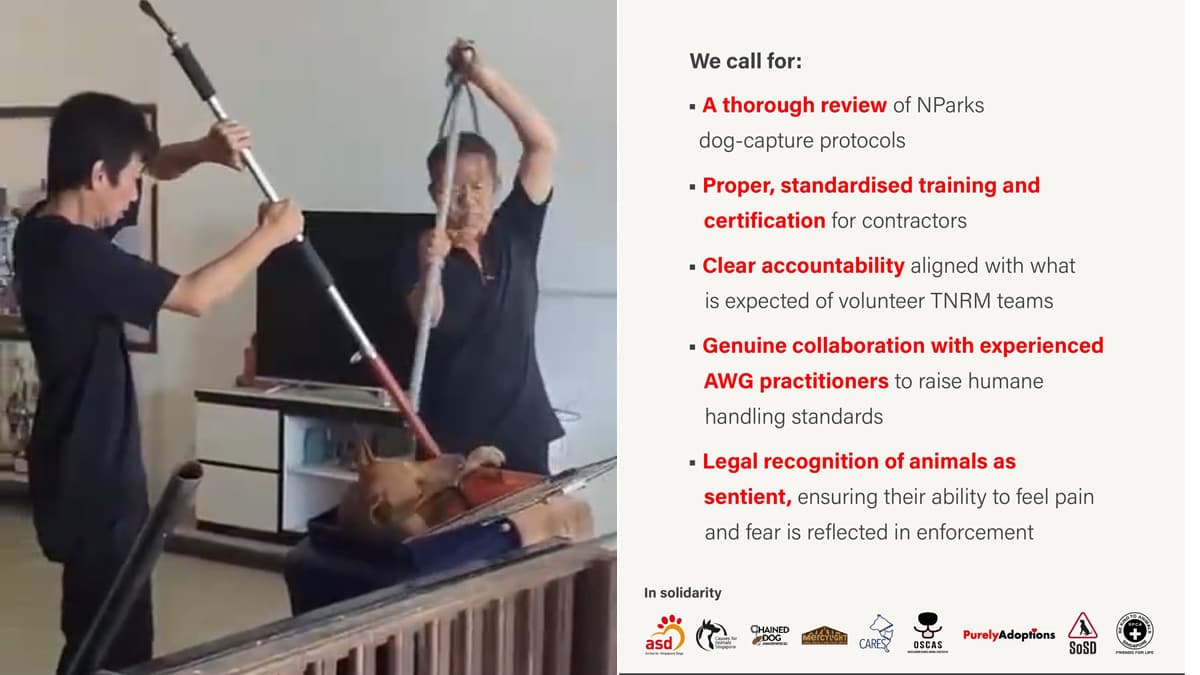Animal welfare groups denounce AVS over Seletar dog operation, urge reforms and humane protocols
Ten animal groups have denounced the forceful capture of stray dogs in Seletar, describing the AVS operation as traumatising and inconsistent with humane standards. The joint statement contradicts AVS’s claim that the force used was within acceptable limits.

- Ten animal welfare groups condemned NParks/AVS for inhumane dog-capture methods at Seletar West Farmway.
- Groups called for a review of capture protocols, mandatory training for contractors, and legal recognition of animals as sentient.
- Footage showing forceful restraint and lack of proper identification raised questions about accountability and humane standards.
Ten leading animal welfare organisations in Singapore have condemned the Animal & Veterinary Service (AVS) for its handling of community dogs during a controversial capture operation at Seletar West Farmway on 14 November 2025.
The statement, issued on 18 November, described the methods used as “traumatising”, “unjustifiably forceful”, and far below acceptable humane standards. The joint message directly contradicts AVS’s assertion that the tools and force employed were within internationally accepted welfare norms.
Signatories include the Society for the Prevention of Cruelty to Animals (SPCA), Chained Dog Awareness Singapore (CDAS), Causes for Animals Singapore (CAS), SOSD, Action for Singapore Dogs Society (ASD), MercyLight Animal Rescue and Sanctuary (MARS), and others.
Footage shows struggling dog collapsing after capture
The backlash followed the circulation of videos on Instagram showing men using catchpoles to forcibly trap stray dogs in Seletar. In one widely shared clip, a brown dog—described by caregivers as about 10 years old and limping—was seen resisting as it was restrained by a pole and pushed into a crate.
The dog later collapsed, reportedly from stress. Observers noted that the animal did not exhibit aggressive behaviour and appeared disoriented by the incident.
Images also showed blood and faeces on the ground, suggesting distress during the operation. The dog was said to rarely leave its usual spot near a nursery, prompting doubts about whether it was responsible for the biting incident that prompted the operation.
Animal advocacy groups reposted the footage, and public criticism intensified online, with calls for NParks and AVS to explain the methods used and the justification for targeting the dogs.
AVS: Operation followed bite complaints, force was “acceptable”
In a statement reported by MustShareNews, AVS’s Group Director of Community Animal Management, Dr Anna Wong, explained that the operation was in response to four bite incidents reported between May and November 2025.
She said the dogs were free-roaming and not owned by the farm on whose premises they were found. The farm had requested AVS’s assistance to remove them.
According to Dr Wong, AVS engaged a licensed contractor to carry out the trapping under the agency’s supervision. She said the use of restraining poles was necessary given the dogs’ reported aggression and risks to public safety.
She also stated that the equipment used was consistent with international animal welfare standards, that no harmful tools such as uncovered wire loops were used, and that the force applied was within acceptable parameters.
Animal groups contradict AVS’s characterisation of events
In their joint statement, the ten organisations rejected AVS’s claims, stating clearly that the force seen in the video—including choking, dragging, and improper use of catchpoles—did not reflect humane handling.
They wrote: “We are deeply concerned about NParks/AVS’ recent handling of the street dogs at Seletar West Farmway 8. While we understand the need to act on a reported biting incident, the level of force used, choking, dragging, and misuse of the catchpole falls far below humane standards and contradicts NParks’ own advocacy for positive training.”
The groups added that rough handling traumatises dogs, making them harder to rehabilitate and rehome. “Shelters and feeders are left to pick up the pieces and rebuild the trust that gets destroyed in minutes,” they wrote.
Key demands: review, reform, and recognition of sentience
The coalition called for a comprehensive overhaul of dog-capture procedures, noting that humane methods are already being successfully employed by volunteer groups under the Trap-Neuter-Rehome/Release-Manage (TNRM) framework.
Their demands include:
-
A thorough review of NParks dog-capture protocols, especially regarding use of force.
-
Standardised training and certification for trapping contractors, to match standards already expected of TNRM volunteers.
-
Clear accountability mechanisms, ensuring that contractors meet humane handling benchmarks.
-
Collaboration with experienced AWG (Animal Welfare Group) practitioners, who can offer practical, humane techniques.
-
Legal recognition of animals as sentient beings, ensuring their capacity to feel pain and fear is considered in enforcement actions.
The statement stressed that if NParks considers current methods “suitable,” then urgent improvements are still needed. “Let’s prove that Singapore can achieve safe outcomes through skill, patience, and kindness,” the groups urged.
Local caregivers dispute danger claims
Community feeders familiar with the dogs at Seletar said they were not consulted prior to the operation. One volunteer who had cared for the dogs for over seven years told The Online Citizen that the dogs were shy and non-aggressive.
She said trappers cited a complaint about a “brown dog” chasing someone, but no evidence or specific identification was provided.
According to the statement from the animal welfare groups, 95% of the dogs in the area had already been sterilised through calm, humane efforts by just two volunteers.
They noted that rough and indiscriminate capture risks undoing years of community work. “No clear identification was ever provided,” the groups said. “‘Brown dogs with a bite history’ is not accountability.”







